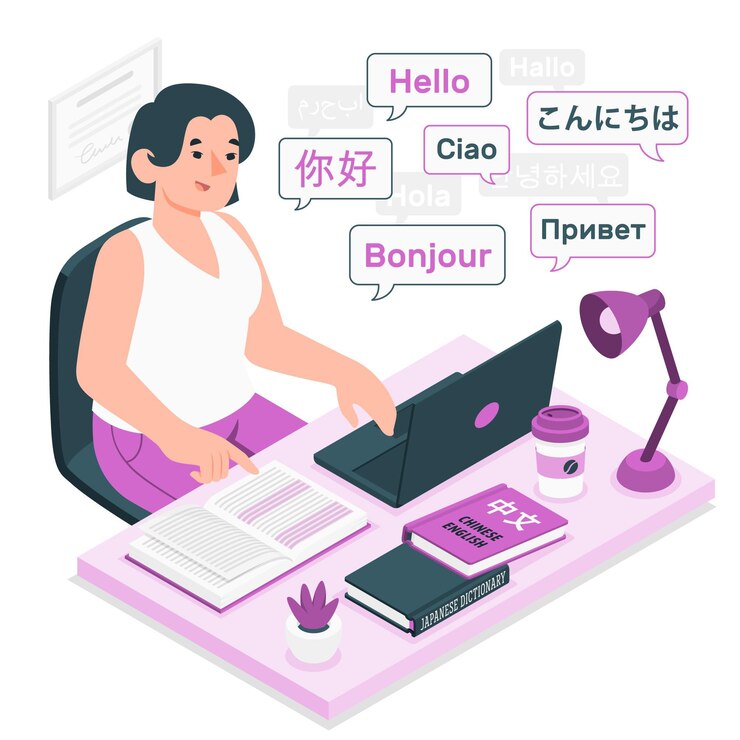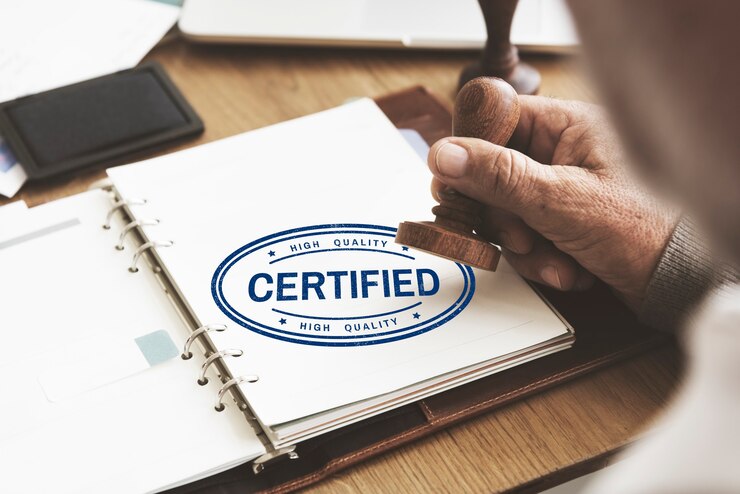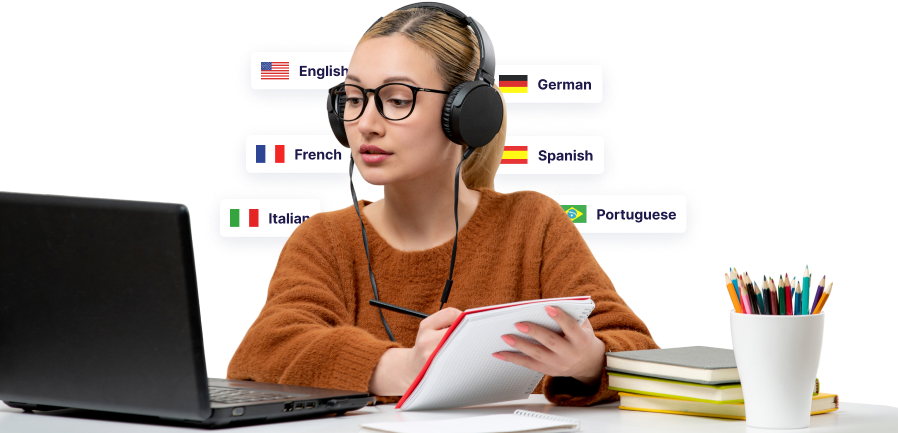Rapid Translate Team
Translators are experts in aiding communication from one language to another. They utilize their skill in several industries worldwide. If this is your dream career, you will need all the information you can get. Learning how to become a translator can help you kick-start a successful career.
Like other professions, there are certain procedures to becoming an expert translator. Following the right steps will help you gain the right recognition in the industry. This blog post provides information on everything you need for a career in translation.

Table of Contents
An Overview of a Translator’s Role
A translator is a person who eases communication by converting written text from one language to another. Translators typically focus on two languages, which are their native language and a different language. However, some may take it further by including other languages.
Learning how to become a document translator requires you to acquire strong skills. The person must be skillful in translating from a source language to the desired language. Professional translators make sure to convey an accurate message throughout the entire process.
Responsibilities of a translator include:
- Making research to understand the cultural references and context of their target language.
- Using acquired knowledge to use accurate expressions, idioms, and syntax.
- Maintaining the tone and style of the source language.
- Speaking, reading, and writing in specialized languages.
- Translating written content such as documents, books, journals, and articles into different languages.
- Creating glossaries or terminology banks for future translation projects.
- Efficiently managing time to deliver quality within the stipulated time.
Several industries work with translators; they are also in high demand for their linguistic skills. They work in business, medicine, education, legal, and government industries. In addition, some translators often own their own businesses or work freelance.
Others also work for agencies or one employer. Depending on the translator, they can choose which job is more flexible. Now that you have identified the roles of translators, let’s discuss how to become one.

How To Become a Professional Translator
Anyone looking to make a career in translation must go through certain steps. Understanding two or more languages is not what makes an outstanding translator. The person must have specialized training to become an expert. This section highlights the steps to make you a professional translator.
1. Choose and Learn a Second Language
While some languages are everywhere worldwide, other less popular languages exist. Thanks to the need to expand, people have started seeing the need for effective language solutions. As a translator, your first step should be identifying and choosing a language where you can utilize your skills.
It should preferably be a less common language because it makes you one-of-a-kind. There is more competition among translators for common languages. However, having a skill set for less common ones puts a new market value on your skill. You must research available jobs by reviewing current translator listings to choose a language.
Alternatively, you can investigate your field’s most sourced languages. Once you’ve chosen a language, you must master it to a high degree of fluency. Growing up in a bilingual environment may help you, but you can choose to study the language in school.
Studying a language allows you to explore more technical aspects like grammar structure, cultural awareness, and specialized terminology. Earning a bachelor’s degree in the language is perfect for a translator. Advanced degrees could make you stand out in the translation industry.
2. Go Through Specialized Training
Fluency is not enough for a translator; you must also develop some translation skills. Providing understandable and accurate official translations of a language requires specialized training. Many universities and colleges offer programs to help prepare people for a career in translation.
In addition, professional bodies like the American Translators Association (ATA) provide helpful resources to help you achieve your goal.
3. Get a Certification
Translators don’t necessarily need a certification to provide translation services. However, getting a certification indicates that you have the needed skills. It also gives you an edge in the industry. The ATA organizes certification programs to help translators become certified.
It offers certification in 34 language combinations to make you a certified translator. At the end of the certification program, you get to use a special designation alongside your name. You can put your designation on your resume, business card, website, and other promotional material.
More than this, there are certification options for specific fields. For example, certified literary translators may get jobs in the publishing field as translators. There are also industry-specific certifications for interested candidates. However, these are often suitable for interpreters, such as medical interpreters.
4. Focus on a Specific Industry
After studying and obtaining certification in a particular language, you should focus on industry-specific terminologies for your chosen field. This knowledge will help you during translation projects. For example, consider studying business terminology to work as a business translator.
There are several ways to achieve this. You can find a learning resource or enroll in a course focusing on your chosen field. You can also study relevant books or compile and study a list of important terms in both languages.
5. Gain Work Experience
Gaining related working experience is also essential in the translation industry. You can offer freelance or contract translation services to gain experience for your resume. You can also volunteer at hospitals and community organizations for more experience.
Additionally, some corporate organizations offer paid or unpaid internships to help people gain relevant work experience. More than this, you should train to use specific computer programs. Several computer programs are useful for aiding translation. Having experience in their operation can give you an advantage.
In addition, it would help to gain more experience in other languages. Acquiring more languages makes your service more marketable and extends wider. For example, if you specialize in translating Spanish and English, studying French will add to your skills.
Now, you can translate French into English or Spanish into English. Over time, you might even translate it into French or Spanish.

How To Become a Certified Translator
Anyone can make a career in translation, but a certification in translation adds a higher standard. Often, certified translators gain more recognition in official settings. Knowing about how to become a certified translator allows you to set better career goals. It allows you to access more opportunities and raise your market value.
Becoming an accredited language translator depends on your location and the certification requirements in your field. Nonetheless, the main step is applying to the necessary professional organizations for accreditation. Several organizations around the world provide certification programs for translators.
One of them is the ATA, which organizes certification exams for applicants. You must identify the licensing body responsible for accrediting translators in your field. Also, understanding how to be a translator begins with your study journey. Therefore, you must have at least one degree in language from a recognized institution.

How To Become a Medical Translator
Document translations are also useful in different parts of the world for caregivers, patients, and pharmacists in a comprehensible language. Anyone in a dilemma with medical misinterpretation will know how challenging it is. Thus, many people have wondered how to become a medical translator to solve this problem.
Becoming a translator in the medical field requires precision and vast knowledge. A medical translator’s job is to ensure 100% accuracy in translated documents. You must also fully understand the meaning of medical terminologies and their usage. Your translations could determine a person’s life.
A single error could result in complications or even something more fatal. For instance, someone could buy the wrong medicine because a translated brochure had a sentence error. Therefore, you begin your certification journey by meeting the basic requirements. In addition, other factors contribute to your medical translator certification status.
At the very least, you should have a high school diploma and be fluent in a language pair. Secondly, you must get a certification from an accredited program by the National Commission for Certifying Agencies (NCCA). This will increase your chances of getting a job and succeeding.
The National Board of Certification of Medical Interpreters (NBCMI) also offers an accredited certification program. The organization offers written and oral examinations for accreditation. It also provides preparatory materials such as webinars, handbooks, and Q&A sessions to help applicants.
How To Become a Translator Without a Degree
While some people pursue various degrees to become translators, this is not always true. You can learn how to become a translator without a degree if you have the required skills. At a minimum, a professional translator has a General Educational Development (GED) or high school diploma.
Employers sometimes don’t even require a formal degree in the target language. Meeting the client’s expectations is always the main goal. So, it would be best not to let your educational level limit your career choice. If you want to pursue a career as a translator without a degree, you can use the following steps:
- Study a target language to gain fluency in it. You can do this on your own or take classes for it.
- Gain experience through internships or volunteering for translation roles in charities and organizations.
- Enroll in training courses to prepare you for a career in translation. Several organizations offer translator training courses as part of their non-degree programs.
- Get certification in translation from accredited organizations. It builds your reputation even without a degree.
Knowing how to become a translator can help you get a job in a professional document translation service company. You can also use this knowledge to identify expert translators. However, if locating a translator is challenging, Rapid Translate can make it easier.
We have used our expertise to select the best team of professional translators to help with your translation projects. We can help you overcome the language barrier and effectively communicate your message in over 60 languages. Extend your reach with our top-quality translation services. Order now to encounter the power of smooth communication!





